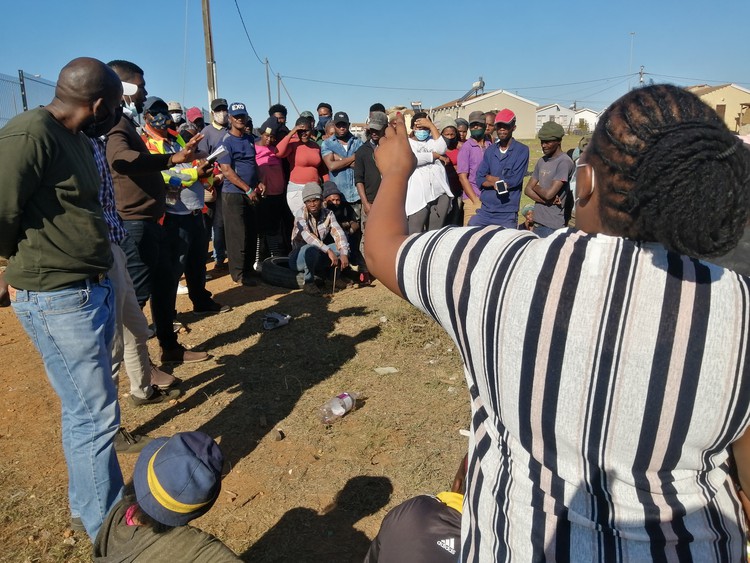No money for electrification, municipal official tells shack dwellers
Residents from five informal settlements in Nelson Mandela Bay Municipality are demanding electricity and other services
Residents from five informal settlements in Ward 41 under the Nelson Mandela Bay Municipality protested at the weekend, demanding electricity among other services. Photo: Mkhuseli Sizani
- Residents from five informal settlements in Ward 41 protested at the weekend, demanding electricity among other services.
- A ward councillor’s car was torched and a bread truck looted.
- The protest started after the Nelson Mandela Bay Municipality began installing poles at Bayland informal settlement. The City says the poles are for lights not electrification.
- Municipal officials have said that there is no budget available to electrify all the informal settlements.
About 500 people from five informal settlements in ward 41 blocked R75 Uitenhage Road with burning tyres and rocks at the weekend, demanding electricity among other services.
During the protest, the vehicle of Ward 41 Councillor Simphiwe Tyukana (ANC) was petrol bombed in front of his house in Nkandla; an Algoa Plant Hire truck was hijacked and torched at Area 10’s play park; and a bread truck was stoned and looted in Joe Slovo. Public Order Police had to disperse the violent protesters.
Police spokesperson Captain Andre Beetge said two women were arrested for public violence.
The protest by residents of Nkandla, New Rest, Mhlolokotshana, Area 10 and Farmer informal settlements erupted when the Nelson Mandela Bay Municipality started installing electrical poles at Bayland informal settlement. But the City says the poles are just for lighting.
Residents argued that Bayland was established recently and only after residents there had violently protested in February, did the municipality start installing services like electricity and toilets at the settlement.
Mziwoxolo Desha, community leader of Nkandla, said that their informal settlements were established in 2017 but were yet to receive services, yet Bayland that only grew in 2019 was now being prioritised.
“In July 2020 we lost our shacks when we clashed with Nkandla RDP homeowners over illegal connections. The municipality also removed our illegal connections while some people were shot and injured in that violent fight,” he said.
Desha said going to the toilet at night in the dark was dangerous, so many people prefer to relieve themselves in the bush near their shacks. All 1,500 shacks are expected to share 30 chemical toilets and four standpipes. “The municipality said we should de-densify our area in order to install electricity. Some of the residents relocated to other informal settlements to make way. But still the municipality has not installed the electricity. Roads are bumpy and we get stuck in the mud on wet days,” Desha said.
Thamie Zigoxo, chairperson of Area 10, told municipal officials who came to quell tensions, “How many times have we been engaging with you in these fruitless meetings? Since I became a community leader in 2019 I have been in and out of the municipal offices. What are you doing with our petitions?”
Zigoxo said without electricity, learners could not do their work at home because most school work is being sent via social media since the start of the pandemic and their cellphones are not able to charge regularly.
“Many people here survive on child support grants and pension. Paraffin is expensive. The open fires, candles and illegal electricity connections are dangerous,” he said.
Thando Tsepane, an official from the office of Mayco Member for Electricity Luxolo Namatte, told protesters that there was no budget for the electrification of shacks. He explained that Bayland was getting lights only because the area is dark, at a cost of R100,000.
“We won’t be able to electrify all your informal settlements in one financial year. We prioritise areas according to when they were started. But please give us a chance to go back to mayco and report your problems.”
The officials asked the residents to send four representatives to their offices on Tuesday at 10am to get feedback.
Support independent journalism
Donate using Payfast

Next: Police and shack dwellers clash over illegal connections in Gqeberha
Previous: Hamba Kahle Wara Fana
© 2021 GroundUp. This article is licensed under a Creative Commons Attribution-NoDerivatives 4.0 International License.
You may republish this article, so long as you credit the authors and GroundUp, and do not change the text. Please include a link back to the original article.
We put an invisible pixel in the article so that we can count traffic to republishers. All analytics tools are solely on our servers. We do not give our logs to any third party. Logs are deleted after two weeks. We do not use any IP address identifying information except to count regional traffic. We are solely interested in counting hits, not tracking users. If you republish, please do not delete the invisible pixel.

